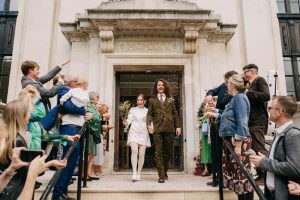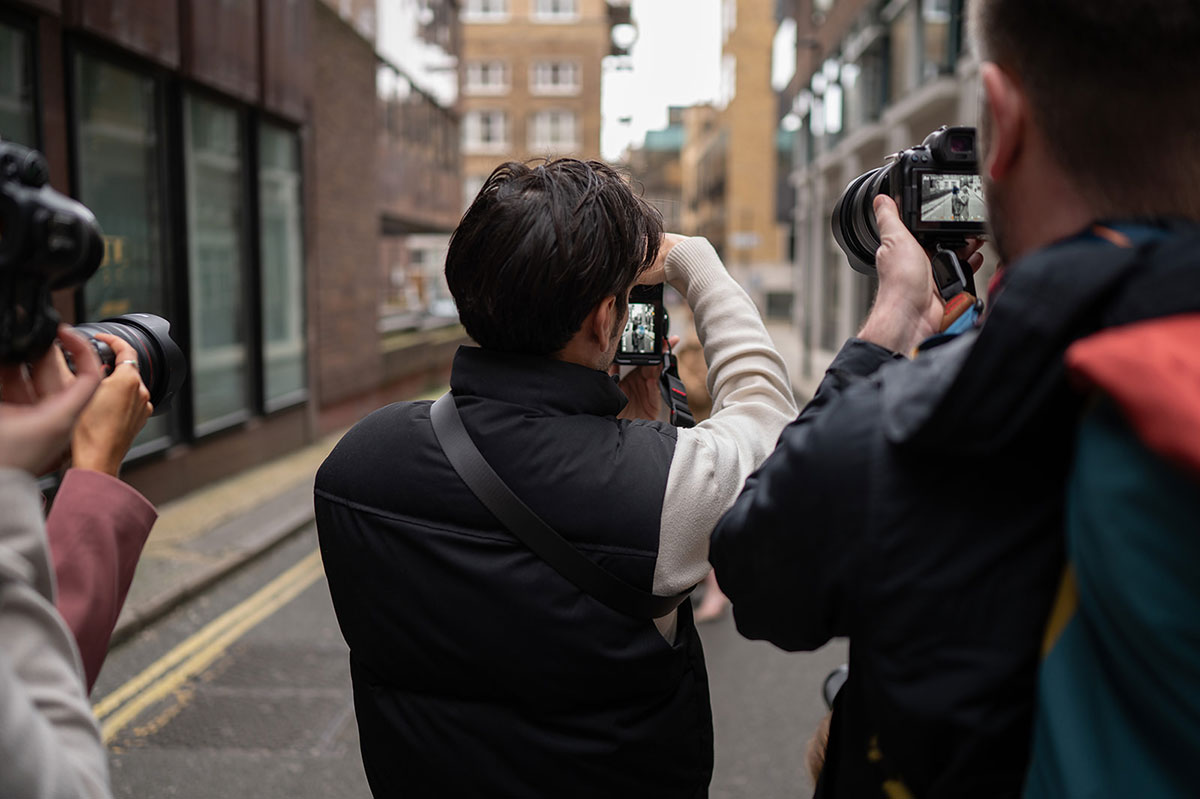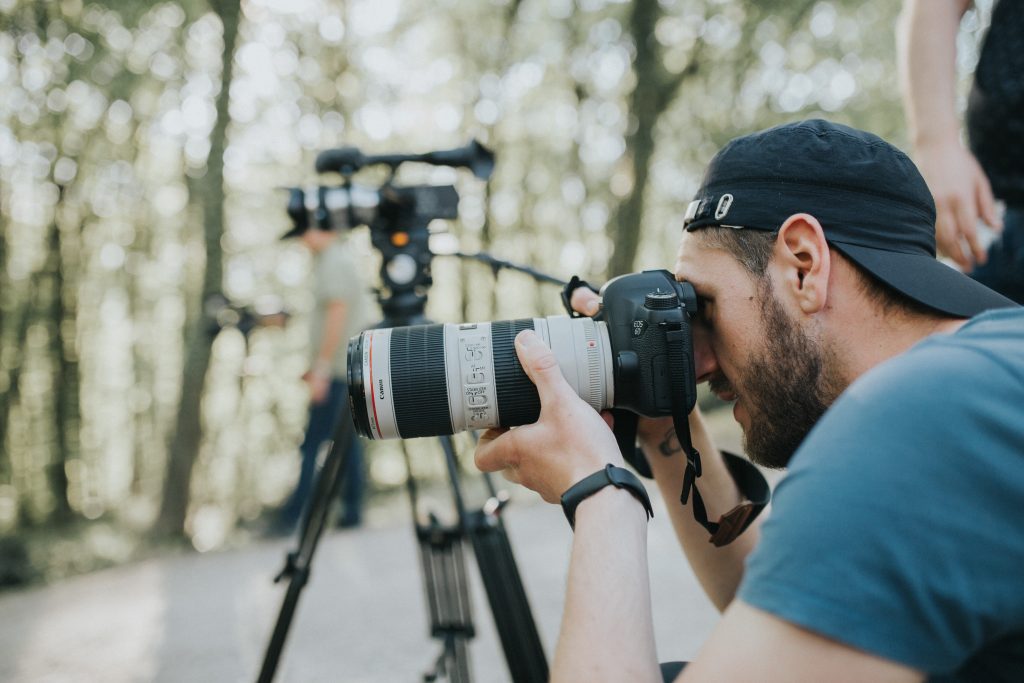To understand how to become a wedding photographer, start by mastering the basics of photography, including exposure, composition, and lighting. Build a varied portfolio by gaining experience through volunteering, second shooting, or assisting established photographers. Invest in quality equipment, hone your editing skills, and actively promote your services to attract clients and grow your business. This guide will show you how to become a wedding photographer, the qualifications needed, and the essential skills for success.
What Are the Main Types of Wedding Photographers?
There are numerous ways to capture a wedding photo, and one approach should suffice. However, a wedding photographer’s job is unique, requiring technical skill, creativity, and the ability to work under professional pressure. Depending on their style and approach, there are several types of wedding photographers:
- Traditional Wedding Photographer: These photographers focus on capturing posed shots, including family portraits, the wedding party, and every major moment. Traditional photographers typically avoid extensive editing, taking their time to get the perfect shot without manipulation.
- Photojournalistic Wedding Photographer: This style aims to tell a story through candid images, capturing spontaneous moments from the photographer’s perspective. It’s a more natural, documentary approach where no staging or manipulation occurs.
- Fine Art Wedding Photographer: These photographers prioritise unique shots, lighting, and framing, creating visually striking and aesthetically pleasing images. Their work is highly creative, with no limits on artistic expression.
- Fashion-Inspired Wedding Photographer: Known for their stylish, high-fashion approach, these photographers often incorporate dramatic, sports-like poses into their shots. This style is bold and popular for couples seeking a trendy, modern look.
- Destination Wedding Photographer: Specialising in weddings abroad, these photographers are experienced in capturing beautiful moments in a variety of settings, whether it’s a cold mountain location or a hot tropical beach.
- Adventure Wedding Photographer: Often working in extreme or unconventional locations, such as mountains or beaches, these photographers focus on capturing couples in love amidst the wild outdoors.
- Hybrid Photographer: Combining both film and digital photography, these specialists blend traditional and modern techniques to offer couples a variety of styles and aesthetics in their wedding photos.
Each type of wedding photographer requires a specific technique to work with people and capture their vision. Therefore, it’s essential to find a style that aligns with your preferences and vision for your brand.
What Does a Wedding Photographer Do?
Specifically hired for the occasion, wedding photographers aim to capture every moment of the couple’s big day with carefully planned shots that highlight the essence of the event. The responsibilities of a wedding photographer include:

- Pre-Wedding Consultation: Before the wedding, the couple meets with the photographer to discuss their preferences regarding specific shots, styles, and any particular images they would like captured. This consultation helps the photographer understand the couple’s vision and expectations.
- Creating a Shot List: The photographer reviews the event schedule and creates a shot list, ensuring that key moments—such as cutting the cake, the first kiss, the first dance, and family portraits—are captured. This list ensures that no important shots are missed.
- Scouting the Location: The photographer visits the wedding venue ahead of time to assess the best spots for photos, the lighting conditions, and potential challenges they may face on the day.
- Capturing Key Moments: The photographer documents the full range of the day, from bridal preparations to the ceremony, the reception, and the couple’s departure. Their goal is to capture both the emotions and the details of each event.
- Directing Poses and Group Shots: Once everyone is ready, the photographer directs the couple, bridal party, and family members for formal portraits and group shots, ensuring everyone looks their best.
- Editing and Retouching: Using professional editing software, the photographer enhances the images to align with the overall theme of the wedding, adding the finishing touches for a polished look.
- Delivering Final Images: After editing, the photographer provides the couple with a collection of images, whether on a CD, in a digital gallery, or in an album, ready for viewing and sharing.
- Managing Client Relationships: Wedding photographers must also focus on building positive relationships with clients, ensuring satisfaction and contributing to a good reputation through effective communication and timely delivery of images.
Wedding photography is a profession that combines technical skills, artistic vision, and professionalism. Photographers are entrusted with capturing moments that will serve as lasting memories of one of the most important days in a couple’s life.
Average Wedding Photographer Salary
Salaries for wedding photographers depend on factors such as location, the number of clients, and years of experience. The average rates for wedding photography in the UK are outlined below:
- Entry-Level Wedding Photographers: Most couples opt for more intimate and budget-friendly weddings, meaning new wedding photographers typically earn between £20,000 and £30,000 a year. Income can vary depending on the number of weddings they book each year.
- Mid-Level Wedding Photographers: As photographers grow their businesses, they can earn between £30,000 and £50,000 annually. With a strong portfolio, a loyal clientele, and a refined style, these photographers see their earnings increase over time.
- Targeted Wedding Photographers: Experienced professionals with a solid reputation can earn between £50,000 and £100,000 or more. Luxury and destination wedding photographers, in particular, are likely to earn at the higher end of this range.
- Freelance Photographers: Freelance or self-employed photographers set their rates depending on the number of jobs and their experience. For weddings, freelance photographers typically charge between £1,000 and £5,000, though the amount can vary depending on the client and the photographer’s standing.
Essential Skills of a Wedding Photographer
Successful wedding photographers possess a mix of technical, interpersonal, and creative skills. The following are key skills required for a wedding photographer:

- Technical Knowledge of Photography: A strong grasp of the technical aspects of photography is essential for capturing quality images. This includes understanding exposure, lighting, composition, and focus. Mastering these elements ensures the photographer can adapt to various lighting conditions. Technical expertise is key to producing well-exposed, sharp, and balanced images.
- Image Editing: Proficiency in editing software like Adobe Lightroom and Photoshop is essential for refining photos. Editing enhances images by adjusting exposure, colour balance, and sharpness. It also allows for the correction of imperfections, ensuring each image meets professional standards. Editing adds the finishing touches that align with the couple’s vision.
- Client Communication Skills: Wedding photographers must be personable and approachable, creating a relaxed environment for the couple. Effective communication helps photographers understand client expectations. It also ensures the couple feels comfortable in front of the camera. Building rapport is key to capturing natural and emotional moments.
- Wedding Day Awareness: Weddings are fast-paced, with many key moments to capture in a short amount of time. A wedding photographer needs to be organised and prepared for any situation. Attention to detail is crucial to ensure all significant events are documented. Being aware of the schedule helps in capturing every important moment.
- Versatility: Wedding photographers must be flexible and quick-thinking, ready to adapt to different situations. Each wedding is unique, with varying lighting, locations, and moods. A versatile photographer can take creative shots from different angles and perspectives. Being able to handle unexpected challenges is crucial on the day.
- Stylisation: A wedding photographer needs to capture the small details that reflect the couple’s personal style. This includes rings, fabrics, flowers, and decorations that add meaning to the images. These details help tell the story of the couple’s day and their journey. Stylisation adds a personal touch to the overall narrative.
- Imagination and Artistic Skill: Wedding photography is not just about documenting moments but about creating art. Photographers need a creative eye to frame unique shots and bring out emotions. Artistic skill allows for capturing memorable, beautiful images that stand the test of time. Imagination helps in seeing moments others might miss, making the photos truly special.
Advice for a Wedding Photographer
Here are some essential tips for becoming a successful wedding photographer:
- Portfolio Development: It is essential to have a wedding-related portfolio, which should not only include wedding items but also various types and aspects of wedding photography. This will show prospective clients that you have experience working with different wedding styles.
- Create Your Style: Differentiation is key in a competitive market. Develop your own unique style by experimenting with various techniques and ideas, and implement them in your work to stand out.
- Invest in Good Equipment: Professional wedding photographers need a range of cameras, lenses, and lighting equipment. It’s crucial to trust your gear during photoshoots, especially when capturing important moments at a wedding.
- Practice Regularly: Wedding photography is no easy task. To build confidence, practice at smaller events. This allows you to improve your skills and prepare for larger, more complex shoots.
- Master Post-Processing Techniques: Editing can enhance your photos significantly. Learning how to use editing software like Lightroom and Photoshop will make a huge difference in your portfolio and the final product you deliver to clients.
- Network with Other Suppliers: Integrating yourself into the wedding industry by building relationships with florists, planners, and other vendors is important. This network can help you transition into other roles within the industry and generate more referrals for your business.
- Have a Wedding Preparation Plan: It’s essential to have a clear plan in place to ensure everything runs smoothly on the day of the wedding. A good preparation strategy not only helps meet expectations but also adds an element of creativity to your work.
Wedding Photographer Requirements
A great wedding photographer must possess the right skills, equipment, and a professional portfolio. So, if you’re starting out, here’s what you’ll need to start a career as a wedding photographer:

- Photography Skills: It’s essential for wedding and event photographers to have strong technical skills in areas like exposure, composition, and lighting. These are critical for capturing high-quality images.
- Experience with Weddings: Practice makes perfect, especially in wedding and event photography. Over time, you’ll become more comfortable with the fast-paced environment and the challenges it presents.
- Professional Portfolio: A strong portfolio will attract clients. A wedding or event portfolio is essential to showcase your work. Make sure to display a variety of shots, from candid moments to detailed portrait styles.
- Equipment: To capture impressive images at weddings, you’ll need quality camera gear, including a DSLR or mirrorless camera, multiple lenses, and backup equipment. This will ensure you’re always prepared.
How to Become a Wedding Photographer
How to Become a Wedding Photographer in Eight Easy Steps:

- Learn the Basics of Photography: A solid understanding of photography is essential. It’s not just about using a camera—it’s about understanding how to capture light and moments. Learn the science behind photography, including camera settings and techniques that will help you produce high-quality images.
- Build a Portfolio: As a beginner, create a unique portfolio that will impress potential clients. If you have no wedding experience but want to focus on weddings, consider volunteering as a second shooter or helping out at friends’ events to gain experience and start building your portfolio.
- Nurture Your Voice: Experiment with different techniques until you find a style that reflects your personal vision. Developing a unique voice is crucial for setting yourself apart in a competitive market and can greatly benefit your career.
- Get the Best Camera Equipment: Invest in a professional camera and essential accessories, such as lenses and lighting equipment. Be sure to have backups on hand to avoid any issues with malfunctioning gear during a shoot.
- Familiarise Yourself with Editing: Editing is a key part of creating polished, professional images. Work on your editing skills using software like Lightroom or Photoshop. Rigorous editing can greatly enhance your photos and help strengthen your portfolio.
- Work with Wedding Events: Find an experienced wedding photographer and offer to assist them as a second shooter. This will provide hands-on experience and help you understand the flow of events at a wedding.
- Promote Yourself: Secure a professional domain name for your website and showcase your portfolio online. Use social media to market your work and connect with other wedding vendors, as these relationships can lead to valuable exposure and referrals.
- Establish Rapport with Clients: Maintaining good rapport with clients is essential for building a successful wedding photography business. Focus on effective communication, professionalism, and being friendly to ensure client satisfaction and encourage referrals.
Get Qualified as a Wedding Photographer
Certificate in Digital Photography, Digital Photography Training, Complete Photography Course, Photography Workshop
Frequently Asked Questions
Why Should You Work as a Wedding Photographer?
Photographers are often engaged in exciting and rewarding activities, and wedding photography is no exception. Many people are eager to collaborate with wedding planners, florists, and decorators—so what appeals to you more: working with florists and planners at a wedding, or attending a monster truck show?
A top English photographer, Bethany Mary, has built a successful career in wedding photography. With her experience and passion for the craft, she has made her mark as an immigrant wedding photographer in both the US and Canada. If you enjoy photography, love working with people, and thrive in a fast-paced environment, a career as a wedding photographer could be ideal for you.
However, it’s important to recognise that the job isn’t all glamour. While being a wedding photographer can be incredibly fulfilling, it also comes with its challenges. For example, wedding photographers in Ontario don’t just see the “bright side” of things—there’s a lot of preparation, long hours, and weekends dedicated to creating beautiful memories for couples. It’s a job that requires commitment, with dozens of weddings to cover each year.
Is a Career as a Wedding Photographer Right for You?
A career as a wedding photographer may be a great fit if you are passionate about photography, enjoy working with people, and thrive in fast-paced environments. This role is ideal for individuals who are creative, detail-oriented, and have strong interpersonal skills, as it requires managing both the technical aspects of photography and client relationships. If you love capturing genuine moments and creating lasting memories for couples, wedding photography could be a fulfilling career path.
What Are Typical Wedding Photographer Salaries?
Wedding photographers who are just starting in the industry can expect to earn between £20,000 and £30,000 annually. As they build their portfolio and gain more experience, their income can rise to between £30,000 and £50,000. Established or high-end wedding photographers, especially those working with luxury clients or shooting destination weddings, can earn £50,000 to £100,000 or more.
Freelance wedding photographers typically set their own rates per wedding, which usually range from £1,000 to £5,000, depending on the package and the photographer’s reputation.
Which Qualifications Can Help with a Career in Wedding Photography?
Formal education is not a must; however, photography certifications or coursework can provide a solid foundation. Many novice wedding photographers start by taking beginner courses that focus on the basics of photography, lighting, and the use of editing software. Professional organisations, like the British Institute of Professional Photography, offer resources, information, and certifications that can make your portfolio more credible and help educate you in the field.
Do I Need to Have Expertise to Start?
Having some knowledge is helpful, but it’s not a requirement. Many wedding photographers begin their careers as second photographers or assistants to gain experience. Other avenues include practising alongside friends who are getting married, volunteering, or working on personal projects to develop both your skills and your portfolio. As you gain experience and confidence, you’ll learn how to navigate the specific challenges of wedding photography.
How Strong is the Demand for Wedding Photographers?
Weddings are significant events in people’s lives, which is one reason why the demand for wedding photographers remains strong. There is still a market for traditional photo albums and a growing demand for artistic approaches to wedding photography. While it’s a competitive field, establishing a unique style, building a strong portfolio, and cultivating a solid reputation can lead to a steady stream of clients and referrals. As your career evolves, you can expand your offerings to include engagement photo shoots, destination weddings, and family photography.
Advancement and Hierarchy in Wedding Photography
Many wedding photographers start out as assistants or second shooters under more experienced photographers. Over time, as they gain experience and build their portfolio, they begin taking on the role of lead photographer, booking clients directly. Some photographers, with a strong reputation and expanded portfolio, may move into the high-end sector, offering premium packages or travelling for destination weddings. Others may choose to open their own studio or expand their brand by mentoring or training aspiring photographers.
Career Transition for Wedding Photographers
Experienced wedding photographers have several career paths to consider. Some branch out into portrait, family, or event photography, while others specialise in niche areas like destination weddings or elopement photography. Some may decide to teach photography, running workshops, online courses, or mentorship programmes. On the business side, photographers can diversify by opening a photography business offering a wider range of services or pivoting to other fields such as journalism, travel, or editorial photography.


